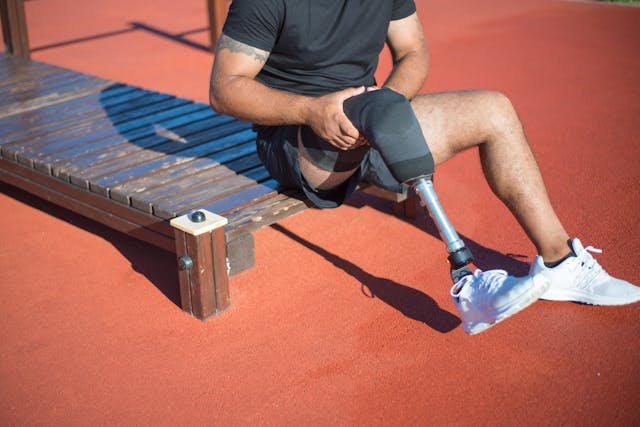Adapting to a prosthetic limb is a journey that involves much more than just wearing a new device. One of the most important parts of this journey is building the right kind of muscle strength. Whether someone is using a below-knee (transtibial) or above-knee (transfemoral) prosthetic, the strength of the muscles around the limb, as well as in the core and upper body, can directly affect how well they walk, balance, and feel each day.
At Robobionics, we’ve seen again and again that people who focus on building muscle strength early in their recovery adapt faster, move better, and experience fewer long-term issues. In this article, we take a closer look at why muscle strength is so important for prosthetic users, how it impacts movement, and what steps can help build the right strength for both below-knee and above-knee prosthetics.
Why Muscle Strength Matters in Prosthetic Use
Muscles are what power movement. When someone loses a limb, the way their muscles work changes—and some muscles have to take on new roles. Building and maintaining muscle strength becomes a key part of learning to move again with a prosthetic.
Supporting the Prosthetic for Better Balance
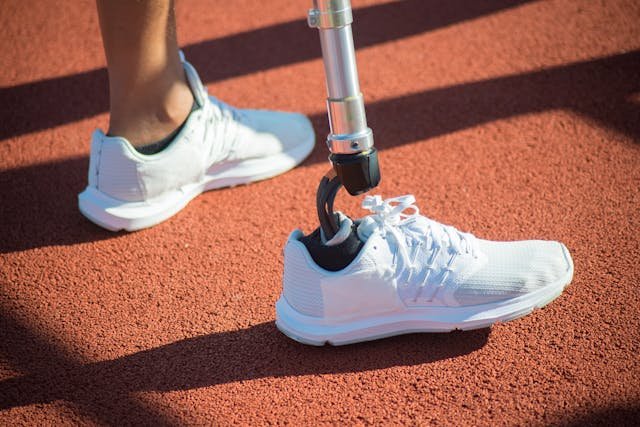
Muscle strength is essential for keeping balance while using a prosthetic. The body needs to stay steady while walking, standing, or moving from one position to another. Without strong muscles around the residual limb, the socket may feel loose, or the user may feel unstable.
For below-knee users, the remaining part of the leg still has muscles that support the knee and foot. These muscles help guide movement and keep the leg aligned. Strength in the calf and thigh muscles helps with forward motion and makes each step feel controlled. When these muscles are weak, walking becomes tiring and uneven.
For above-knee users, the need for muscle support is even greater. Without a natural knee joint, the hip muscles must work harder to lift and move the prosthetic leg. Weak hip and glute muscles can make walking feel like a struggle. That’s why building strength is one of the first goals in post-amputation rehab.
Helping With Energy Efficiency
When muscles are strong, the body moves with less effort. This saves energy and makes daily tasks easier to perform. But when muscles are weak, the body tries to make up for it by using other muscles in ways they weren’t meant to be used. This creates extra work, which can lead to tiredness, soreness, and long-term problems.
For below-knee users, strong quadriceps and hamstrings help push off the ground and move the prosthetic foot forward. This reduces the need for swinging the leg or leaning to one side. For above-knee users, strong core and hip muscles help control the prosthetic knee and keep the pelvis level during walking.
Muscle strength is also linked to joint health. When muscles are doing their job, the joints don’t get overloaded. This helps prevent pain in the back, hips, or shoulders—common complaints among prosthetic users who don’t have enough muscle support.
Improving Confidence and Reducing Fall Risk
Confidence in walking often comes from knowing the body is strong enough to move safely. Muscle strength helps prevent falls, especially when changing direction, walking on uneven ground, or stepping up and down stairs. Strong legs and core muscles react quickly to shifts in balance, helping the user stay upright.
For below-knee amputees, this confidence comes from the ability to trust their real knee and the muscles around it. For above-knee users, confidence grows when the hips and core can manage the movement of the prosthetic knee without hesitation.
At Robobionics, we include strength training in our rehabilitation plans from the very beginning. We know that when users feel strong, they walk taller, feel safer, and are more likely to enjoy daily movement.
Building Strength After a Below-Knee Amputation
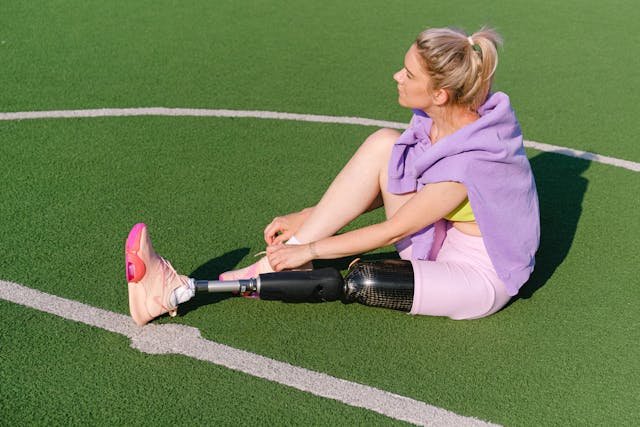
Below-knee amputees often have an easier time adapting to their prosthetic, partly because they keep their knee joint. Still, they must focus on targeted muscle training to support smooth walking and full-body stability.
Focusing on the Lower Leg and Thigh
The muscles in the lower leg, such as the gastrocnemius and soleus, help control ankle movement and push the foot off the ground. After amputation, these muscles are often shortened or weakened. Strengthening them can help improve step control and balance.
The thigh muscles—especially the quadriceps and hamstrings—also play a major role. They guide the knee during walking and support standing from a seated position. Exercises that target these muscles improve control of the prosthetic and reduce fatigue when walking longer distances.
Users who regularly work on strengthening their lower limb muscles find that their gait becomes more natural over time. Their steps feel more stable, and the risk of falls goes down. This is one of the fastest ways to build confidence in the early recovery phase.
Engaging the Core for Total Body Support
Many people don’t realize how important the core is when walking with a prosthetic. The core includes the abdominal and lower back muscles that help keep the spine straight and the hips level. When the core is weak, the body leans to one side or shifts too much while walking, wasting energy and causing discomfort.
Transtibial users benefit greatly from having a strong core. It supports the alignment of the body and improves posture, which helps the prosthetic function better. Even simple exercises like sitting upright, doing gentle twists, or balancing on one foot can activate the core.
A strong core also improves control when moving in tight spaces, changing direction, or climbing stairs. It brings the entire body into harmony, making each step feel lighter and more connected.
Progressive Training Over Time
Muscle strength does not return overnight. It builds slowly, through regular and consistent effort. Starting with small, controlled exercises and gradually increasing resistance helps prevent injury and encourages proper form.
In the beginning, users may only be able to do light movements. That’s okay. What matters is sticking with the program. Over time, these small movements grow into full-strength routines that support walking, standing, and even running.
At Robobionics, we provide users with personalized rehab plans and home-based exercise tools. These programs are designed to keep motivation high and help users see progress week by week. As strength improves, so does comfort and energy efficiency.
Building Strength After an Above-Knee Amputation
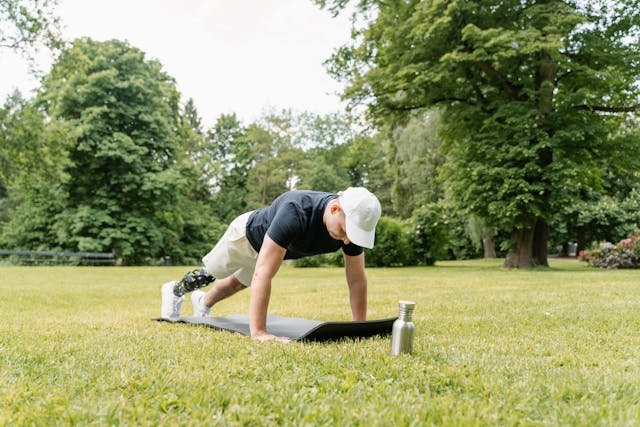
Above-knee amputees face a different set of challenges. Since they don’t have a natural knee, the hip and core muscles must take on more of the work. This means muscle strength plays an even more central role in successful prosthetic use.
Strengthening the Hips and Glutes
The hips are the powerhouse for above-knee users. They help swing the prosthetic leg forward, support the pelvis during walking, and keep the upper body aligned. When these muscles are weak, the user may struggle with uneven steps, hip hiking, or slow, tiring movement.
The gluteal muscles are especially important. They help with standing, climbing, and controlling the stride. Without strong glutes, users tend to lean backward or walk with a limp. This not only wastes energy but can also lead to joint pain over time.
Training the hips involves specific exercises like leg lifts, bridges, and resistance band work. These exercises improve control, reduce stress on the lower back, and make it easier to trust the prosthetic knee.
Building a Strong and Stable Core
For transfemoral users, the core must do even more work than it does for below-knee users. It provides the balance needed to swing the leg properly and helps absorb the weight of the prosthetic during standing and sitting.
Weak core muscles can make it hard to control the prosthetic, especially when walking at different speeds or changing direction. They can also lead to poor posture, which affects the alignment of the socket and increases pressure points.
A strong core leads to better control over every movement. It makes transitions from sitting to standing smoother and helps users avoid common problems like socket discomfort or instability on uneven ground.
Controlling the Prosthetic Knee
Unlike below-knee users, above-knee users must learn how to manage a mechanical or electronic knee joint. This takes strength, timing, and body awareness. Strong hip flexors help swing the leg forward, while strong extensors help lock the knee when needed.
Without this control, the prosthetic knee can feel unpredictable or unsteady. The user may hesitate, walk with fear, or avoid certain movements altogether. But with the right strength, the knee becomes a trusted partner in movement.
At Robobionics, we train users to master their knee joints with targeted exercises and clear instruction. We also ensure the knee chosen matches the user’s physical ability, so every movement feels responsive and natural.
Long-Term Muscle Maintenance for Prosthetic Users
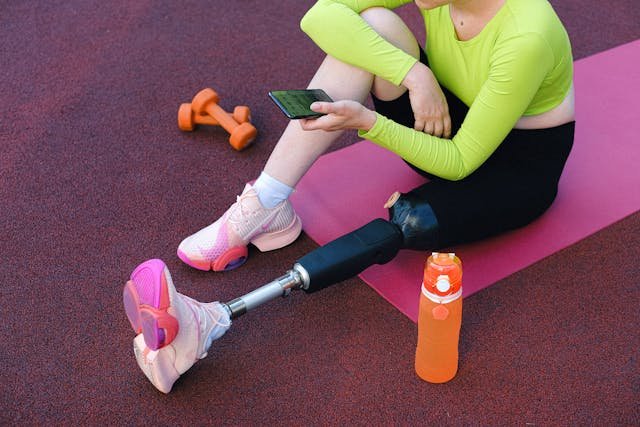
Once strength is built, it needs to be maintained. Daily life can place wear and tear on the body, and even the best prosthetic won’t perform well if the muscles that support it are ignored.
Staying Active Through Daily Life
Movement keeps muscles healthy. Even simple daily tasks like walking to the market, cooking, or cleaning help keep the body strong. But it’s also important to set aside time for regular strength-building exercises.
Both below-knee and above-knee users benefit from staying physically active. This doesn’t mean running marathons—it means finding ways to move that feel enjoyable and repeatable. Yoga, walking, stretching, and low-impact strength routines are great ways to stay fit.
Robobionics encourages users to keep moving, offering motivation and tools that fit into real life. Our users often tell us that regular movement not only improves strength—it improves their mood and confidence, too.
Watching for Changes and Responding Early
Over time, the body changes. Muscle tone can go up or down, the limb can change shape, and new habits can form. Paying attention to these shifts helps avoid problems. If walking feels harder, or if pain starts to appear, it may be time to revisit strength routines.
This is why regular check-ins are important. At Robobionics, we offer routine follow-ups to evaluate strength, posture, and prosthetic alignment. Early action keeps small problems from turning into big ones.
We also encourage users to keep a journal or log of how they feel during daily movement. This helps track progress and makes it easier to spot when changes in muscle strength might be affecting comfort or efficiency.
Staying Motivated and Connected
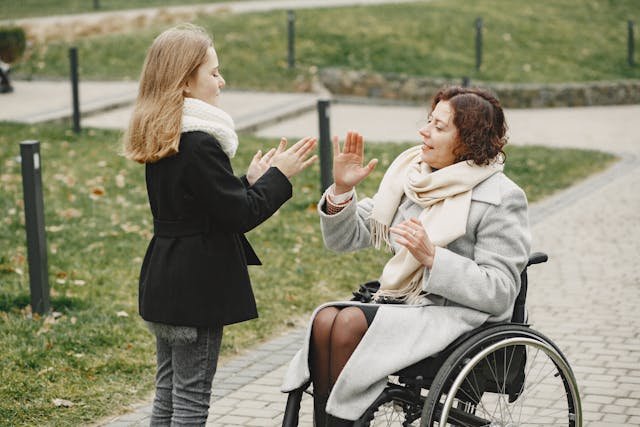
Muscle strength takes time and consistency. It’s easy to lose focus without the right support. That’s why we offer group support, peer meetups, and digital rehab tools that keep users connected and inspired.
Seeing others succeed makes it easier to stay motivated. Sharing progress, asking questions, and getting encouragement from the Robobionics community can help turn exercise into a habit that lasts.
Adaptation is not just about physical strength—it’s about mindset. When users feel supported, their energy grows, their strength builds, and their movement becomes more natural with every step.
How Robobionics Helps Users Build Strength and Adapt Faster
At Robobionics, we believe that adapting to a prosthetic is not just about wearing a new limb—it’s about building a stronger, more confident body that works with it. That’s why muscle strength is at the heart of everything we do. From design to rehabilitation, we focus on helping users build the power and control they need to walk better, move longer, and feel more at ease.
Personalized Prosthetic Design That Supports Movement
The first step to strong movement is a prosthetic that works with your body—not against it. Every limb we make at Robobionics is customized based on your shape, strength, and goals. Whether you’re a transtibial or transfemoral user, we take precise measurements and use lightweight, high-performance materials to build sockets and components that fit perfectly.
When a prosthetic fits well, the muscles around it can do their job properly. You don’t waste energy trying to keep your leg in place, and your muscles can focus on supporting movement instead of reacting to discomfort. This also allows you to train more effectively, since the prosthesis becomes a natural extension of your body.
We also select components—like feet and knees—that match your muscle power and gait style. If you’re still building strength, we recommend joints and feet that provide extra support. As your strength improves, we help you upgrade or adjust your setup to match your growth.
Strength-Focused Rehab, Designed for Real Life
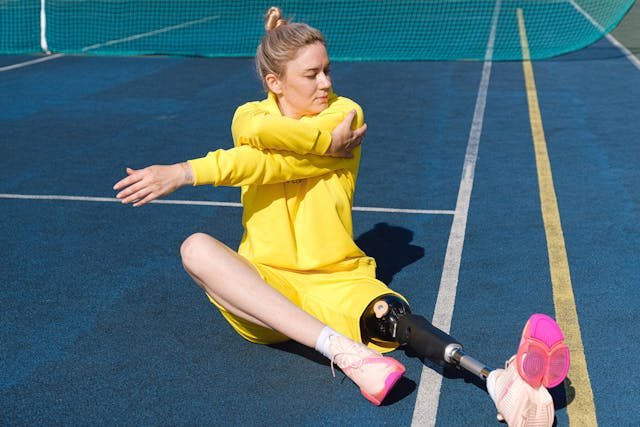
Strong muscles don’t build themselves. That’s why we provide each user with a guided rehabilitation plan that includes specific exercises to build leg, hip, and core strength. These plans are simple, easy to follow, and designed to fit into your daily life—whether at home or at a clinic.
Our gamified rehab tools make training more engaging. You can track your progress, get reminders, and stay motivated with fun tasks that focus on balance, coordination, and muscle control. These tools are especially helpful for users who need structure but want the flexibility of home-based training.
We work closely with physiotherapists and rehab partners across India to make sure your strength-building plan stays on track. From day one to your latest milestone, you’re never doing this alone. Our team checks in regularly to adjust your plan, answer questions, and help you move forward without pain or fear.
Ongoing Support for Long-Term Strength
Muscle strength changes over time—especially if your routine, health, or weight changes. That’s why we stay with you even after your prosthetic is fitted. Robobionics offers free follow-up sessions where we check your strength, gait, and comfort. If anything needs to be improved—like socket fit or component alignment—we take care of it fast.
We also host community sessions and workshops that focus on long-term strength and mobility. These sessions help you stay up to date on the latest techniques, meet other users, and stay motivated to continue building strength even months or years after your fitting.
Our goal is to help you walk into every new day feeling strong, stable, and ready. Because when your body feels powerful, your life feels more open—and every step becomes a step toward independence.
Ready to build lasting strength with a prosthetic designed just for you? Book a free demo with Robobionics today and experience how powerful your body can feel with the right support.



